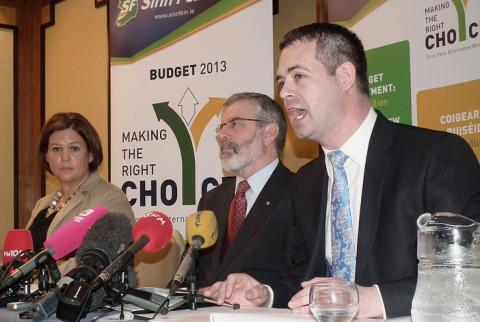In defence of populism

Populism can be progressive or reactionary, democratic or authoritarian. But it is always a challenge to the status quo and is most powerful when a political or economic system is in crisis. By Eoin Ó Broin.
In his end of year review Sunday Business Post political editor Pat Leahy described Sinn Féin’s opposition to austerity in 2012 as “aggressive and populist”.
His description is one that has a broad currency among political commentators.
The charge of populism is rarely complimentary. It suggests a politics of pandering to the people irrespective of the costs. It pits popularity against wisdom and short-term political gain against long-term social and economic sustainability.
When used in this sense populism is viewed as a cynical and dishonest style of politics. It seeks to manipulate public opinion by playing to its desires and emotions. In doing so it reveals a less than full commitment to democratic norms.
Populism is, according to this account, about the pursuit of power for powers sake. At best it is foolish. At worst it is reckless.
Given that populism has such a negative connotation you would expect the rest of this column to argue against Pat’s description of Sinn Féin.
But no, he is right. Sinn Féin’s entire political project, including our opposition to austerity, is populist, and unashamedly so.
Where Pat is wrong is in his understanding of populism.
The unflattering sketch of populism outlined above is based on an unstated prejudice. It betrays a worldview that is deeply distrustful of popular opinion, and the ability of people to know what is in their own best interests.
It pits the rationality and expertise of the technocrat against the irrationality and gullibility of public opinion. And it views politics as the management of short-term public desires in accordance with long-term technocratic wisdom.
This way of thinking about politics has become increasingly dominant in recent years, particularly across the European Union. It is elitist, technocratic and distrustful of the people. It is also now in a deep crisis.
And it is here that the real problem with populism is to be found.
Populism is not an ideology nor is it a project as such. It is a way of doing politics. It seeks to mobilise disparate social actors by linking their individuals concerns into a single coherent popular movement.
In doing so it asserts that these individual demands cannot be met within the parameters of the existing order. Their resolution demands a level of systemic change not available within the existing rules of the game.
It pits the people against an elite. It values the wisdom of ordinary women and men over the technical knowledge of the expert. Its politics is expansive and participative, not restricted to the world of professional politicians and their well-paid advisors.
Populism can be progressive or reactionary. It can be democratic or authoritarian. But it is always a challenge to the status quo and is most powerful when a political or economic system is in crisis.
The defining feature of populism is that it seeks to restore the primacy of the people as the foundation of any democratic society and in doing so empower the people to shape that democracy in accordance with their needs and desires.
Political theorist Ernesto Laclau is right when he says that populism is subversive of the existing order of things and the starting point for radical reconstruction of a new order.
The economic and social crisis that has gripped Ireland and the wider world since 2008 has shaken the status quo. Politics has been discredited. People are angry. Their trust has been broken. They no longer believe that the political system has the will or the capacity to respond to their legitimate demands. And they are right.
It is to these people that Sinn Féin speaks. We are trying to convince those most aggrieved by the failure of politics that their concerns can be met, but only if they come together in a truly national popular movement for social, economic and political change.
We seek to mobilise these people in opposition to the corruption and mismanagement of the political elite and their coterie of senior civil servants, bankers and developers who together have done so much damage to our society.
But more than this we seek to mobilise in support of a New Republic in which popular sovereignty is restored and political and economic power returned to where it rightly belongs, in the hands of the people.
In this sense Sinn Féin’s political project is truly populist, but a populism that is democratic, egalitarian and progressive.
And it is this, more than anything else, that so troubles those who continue to believe that our broken political system is not yet beyond redemption.
Eoin Ó Broin is a political activist, writer and member of Sinn Féin.
Image top: Sinn Féin.
